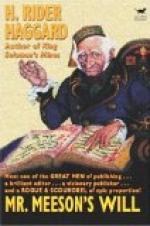Then came another awkward pause.
“Well, Mr. Meeson,” said Augusta, at last rising brusquely from her chair, “the document belongs to you, and so I suppose that you had better see it. Not that I think that it will be of much use to you, however, as I see that ‘probate had been allowed to issue,’ whatever that may mean, of Mr. Meeson’s other will.”
“I do not know that that will matter,” said Eustace, “as I heard a friend of mine, Mr. Short, who is a barrister, talk about some case the other day in which probate was revoked on the production of a subsequent will.”
“Indeed!” answered Augusta, “I am very glad to hear that. Then, perhaps, after all I have been tattooed to some purpose. Well; I suppose you had better see it,” and with a gesture that was half shy and half defiant she drew the lace shawl from her shoulders, and turned her back towards him so that he might see what was inscribed across it.
Eustace stared at the broad line of letters which with the signatures written underneath might mean a matter of two millions of money to him.
“Thank you,” he said at last, and, taking up the lace shawl, he threw it over her again.
“If you will excuse me for a few minutes, Mr. Meeson,” interrupted Lady Holmhurst at this point; “I have to go to see about the dinner,” and before Augusta could interfere she had left the room.
Eustace closed the door behind her, and turned, feeling instinctively that a great crisis in his fortunes had come. There are some men who rise to an emergency and some who shrink from it, and the difference is, that difference between him who succeeds and him who fails in life, and in all that makes life worth living.
Eustace belonged to the class that rises and not to that which shrinks.
CHAPTER XV.
EUSTACE CONSULTS A LAWYER.
Augusta was leaning against the marble mantelpiece—indeed, one of her arms was resting upon it, for she was a tall woman. Perhaps she, too, felt that there was something in the air; at any rate, she turned away her head, and began to play with a bronze Japanese lobster which adorned the mantelpiece.
“Now for it,” said Eustace to himself, drawing a long breath, to try and steady the violent pulsations of his heart.
“I don’t know what to say to you Miss Smithers,” he began.
“Best say nothing more about it,” she put in quickly. “I did it, and I am glad that I did it. What do a few marks matter if a great wrong is prevented thereby? I am not ever likely to have to go to court. Besides, Mr. Meeson, there is another thing; it was through me that you lost your inheritance; it is only right that I should try to be the means of bringing it back to you.”
She dropped her head again, and once more began to play with the bronze lobster, holding her arm in such a fashion that Eustace could not see her face. But if he could not see her face she could see his in the glass, and narrowly observed its every change, which, on the whole, though natural, was rather mean of her.




